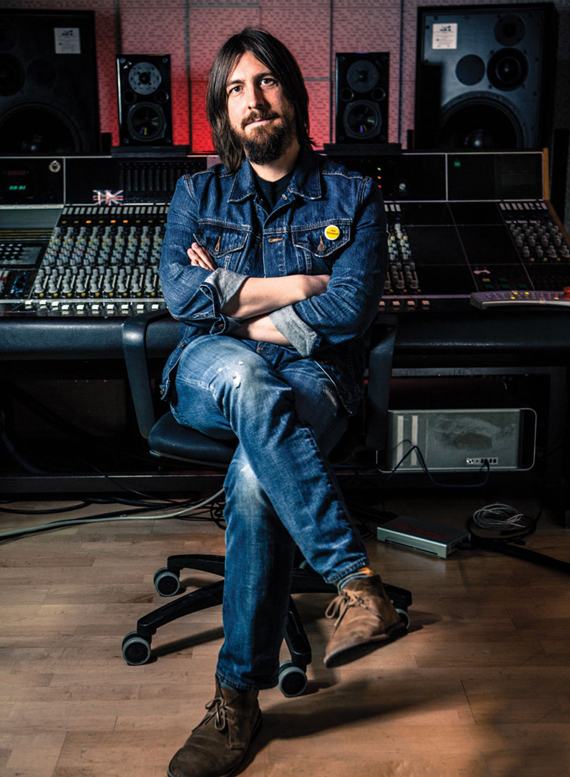

Dave Cobb. Photo: Michael W. Bunch
Dave Cobb sat down with MusicRow at his Nashville home studio just one day before his big win at the 49th annual CMA Awards in early November. Although he was nominated as a producer for Chris Stapleton’s Traveller, Cobb’s prediction about the following day’s ceremony seemed clear: “There’s no way they’re going to give it to us!”
Of course, Stapleton ended up sweeping all three categories he was nominated in—including album of the year for the Cobb-produced Traveller. The acclaimed project has sold nearly 375,000 copies since the live ABC award show, with a total of 470,000 moved to date. On Monday (Dec. 7), Traveller received Grammy nominations for Album of the Year and Best Country Album, while the title track will compete in the categories of Best Country Solo Performance and Best Country Song. Cobb also nabbed a Producer of the Year nomination.
A native of Savannah, Georgia, Cobb has also produced albums like A Thousand Horses’ Southernality, Jason Isbell’s Something More Than Free and Southeastern, in addition to Sturgill Simpson’s Metamodern Sounds in Country Music.
Read the full interview with Cobb in MusicRow’s 2016 Next Big Thing print issue.
On being a Nashville outsider:
I’ve always been an outsider in country but I feel like everybody has been really sweet and accommodating. They seem to be interested in these records in a good way.
When my [go-to session players] all got hired away from California and came here, I had to move too. They make me look really good. They aren’t a part of the Nashville establishment. Not that I don’t want to be a part of it, but I feel safe with those guys. It’s fun to work with them and I give a lot of credit for the sound to them. Of course
Vance Powell came in to engineer Stapleton’s record and Justin Niebank mixed Thousand Horses’ Southernality.
On his recording approach:
Most of my records are based around the singer. The band has to play to them. It may work for some people to record like a modern assembly line—cutting instruments separately—but I just like that live vocalist. At the end of the day, people listen to the singer more than anything else. Why not put them first? People also talk about how an artist may be so much better live than on the records. Why does it have to be any different? Someone told me a long time ago that records happen in the live room, not the control room. So I have that philosophy.
Records like “Wichita Lineman” send chills down my spine. I’m digging for that with every artist, whatever that is. If you get the track and groove right, the singer sings right. A lot of it is clearing the path for the singer so they can relax and enjoy themselves.
On his early influences:
My parents were Pentecostal so they listened to a lot of ‘50s, Elvis and the Oak Ridge Boys. My first loves though were the Beatles and The Rolling Stones. When I met Shooter [Jennings], he got me into “good country music”: Waylon [Jennings], his mother Jessi Colter and Paul Kennerley’s White Mansions [a 1978 concept album about the Civil War] changed my life. I kept digging and found Jerry Reed. I love country music that has heart and a rock ‘n’ roll spirit. Lately it’s been chasing anything of Alan Lomax’s field recordings, ‘30s prison gangs, front porch recordings, and mountain recordings.
All those Stones, Zeppelin, or Beatles records were made by figuring it out in the studio. That’s why I don’t like demos. When you hear a demo, you get used to how things are, as opposed to your gut reaction about finding the right tempo or adding parts. Those ideas begin to disappear the more you hear a demo.
Same way with pre-production because when you land on a riff for the first time, that’s when you play it with the most conviction. You can tell those ‘70s Waylon records were made just by figuring it out in the studio and figuring out when the vibe was right. I’m very much a student of those old albums. They’re more human.
On A Thousand Horses:
I did an EP for them in 2010 when they were on Interscope. Jeff Sosnow in A&R introduced me to them. We hit it off because we were all from the South. One of the guys is from Savannah too. It was like people from the same backyard goofing off in Los Angeles. I consider those guys like little brothers. We stuck together after Interscope and made some demos, which became Southernality.
On Jason Isbell:
The lyrics of the Drive-By Truckers song, “Outfit,” crushed me. I was really homesick for the South in California. When I got to Nashville, Jason’s manager, Traci Thomas connected us. That was a stroke of luck. Ryan Adams was supposed to produce him. That fell through and we were just fortunate enough to cut [2013’s] Southeastern in the middle of this incredible point in his songwriting.
On Sturgill Simpson:
Shooter pointed Sturgill out at a concert, saying, “That’s the best singer in Nashville.” We met again a few days later and started going in the studio. I didn’t think twice about it—he has a natural gift.
On Chris Stapleton:
When I heard his voice, I was stopped in my tracks. He is the ultimate cool. There are songs on Traveller where he was literally just testing the mics. It’s frightening how good he is.

About the Author
Eric T. Parker oversees operations and contributes editorial for MusicRow's print magazine, MusicRow.com, the RowFax tip sheet and the MusicRow CountryBreakout chart. He also facilitates annual events for the enterprise, including MusicRow Awards, CountryBreakout Awards and the Rising Women on the Row. eparker@musicrow.com | @EricTParkerView Author Profile


